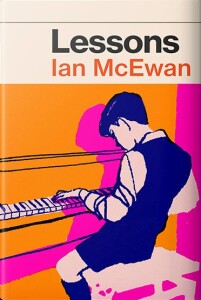
The story begins in May 1986 with 37-year-old Roland Baines worrying about how the Chernobyl nuclear plant disaster might harm his infant son in their London home. Sleepless, he remembers being 14, at boarding school, and the experience that changed his life.
McEwan’s latest novel gives us that life. All of it. The novel clocks in at 448 pages, which is way too long to spend in the company of someone who is not particularly interesting. I would have abandoned it early on if it hadn’t been my book club’s choice for the month.
Some in the book club found Roland boring, and most of us considered him passive, someone who drifts through life, reluctant to make a commitment. The few decisions he does make are self-destructive, twisting his future away from achievement and accomplishment into the morass of surviving on low-level dead-end jobs.
When we meet him in 1986 he still thinks of himself as—potentially—a professional poet, but is working as a tennis instructor and piano player in a lounge, while caring for his son. “How easy it was to drift through an unchosen life,” he thinks.
The story skips around in time, too much so according to some in my book club who found the narrative hard to follow. We learn that his German-born wife left him to bring up their newborn son as a single parent while she goes off to become the successful writer he aspired to be. Far from resenting her, milquetoast Roland thinks she did the right thing because her novels are so good.
My book club discussed the idea that not everyone does great things; there are ordinary people who just deal with their circumstances and go on. There have been many great novels about such people. This is not one of them. It’s too long-winded, and the main character too dull.
Roland’s passivity leads to a reluctance to commit himself: to a career, a partner, a skill. The only commitment that doesn’t waver is to his son. That is the best thing I can say about Roland. He changes the diapers, takes him to the playground, does the laundry and cooking. Not a small job, of course, but are we supposed to think him extraordinary because he does what women everywhere do to no applause?
The book is set in motion, in a sense, by the Cuban Missile Crisis. Convinced he is about to die, young Roland makes a choice that turns out to be disastrous for his future. Throughout the story, the events of his life are tied to events in the larger world. He is present for the fall of the Berlin Wall. We see how he is affected by the Suez Canal crisis, the attack on the World Trade Center, Margaret Thatcher’s reign, Brexit, and finally the Covid pandemic.
Having Roland be a microcosm of an entire generation—the privileged one that enjoyed the post-war boom and surge in educational opportunities—feels insulting. The author comes across as a chiding teacher, saying that we Boomers, like Roland, have never lived up to our potential. Well, perhaps we haven’t, but we are not all such failures.
My book club has read several of McEwan’s books. We agree that his writing is excellent, but unfortunately his characters too often are not interesting and even unpleasant. Also, as here, female characters are not developed well. From Roland’s predatory piano teacher to his narcissistic ex-wife to his Earth Mother girlfriend, they are one-note characters. Of course, in this case we are seeing them through Roland’s eyes, which perhaps says more about him.
As a writer I was most interested in how the author brilliantly integrates current events into the story. They are not tacked to add context, but function fully as part of Roland’s story. I find much to admire in McEwan’s writing and have loved some of his books. This one needed an editor.
Have you read a novel that failed to live up to its potential? Where do you think it went off course?

Thanks for this insightful review. I’m a fan of Ian McEwan’s books, but this one was very disappointing and just dragged on. I saw his interview on CBS Sunday Morning and was thrilled at the prospect of his new book, which he admitted was slightly autobiographical.